
Settler Colonial Studies
Scope & Guideline
Connecting History, Culture, and Law for a Just Tomorrow
Introduction
Aims and Scopes
- Historical Analysis of Settler Colonialism:
The journal focuses on the historical trajectories of settler colonialism, examining how past events shape contemporary realities and relationships between settlers and Indigenous populations. - Interdisciplinary Approaches:
Utilizing various methodologies from fields such as history, sociology, anthropology, and cultural studies, the journal encourages interdisciplinary scholarship that broadens the understanding of settler colonial issues. - Indigenous Perspectives:
A core aim is to amplify Indigenous voices and perspectives, exploring their histories, resilience, and responses to settler colonial practices. - Critical Examination of Power Dynamics:
The journal critically analyzes the power structures, legal frameworks, and cultural narratives that underpin settler colonialism, highlighting the ongoing impacts on marginalized communities. - Exploration of Intersectionality:
Research often intersects with themes of race, gender, class, and sexuality, examining how these identities influence and are influenced by settler colonial contexts.
Trending and Emerging
- Decolonization and Indigenous Sovereignty:
An increasing focus on decolonization practices and the assertion of Indigenous sovereignty is evident, reflecting a broader movement towards recognizing and reinstating Indigenous rights and governance. - Environmental Justice and Climate Change:
Emerging discussions around the intersections of settler colonialism, environmental justice, and climate change are gaining traction, emphasizing the impacts of colonial practices on land and ecological systems. - Gender and Sexuality in Settler Colonial Contexts:
There is a notable trend toward exploring how gender and sexuality intersect with settler colonialism, examining the roles and experiences of marginalized genders and sexualities within these frameworks. - Transnational and Comparative Studies:
Recent publications reflect a growing interest in transnational and comparative analyses of settler colonialism, highlighting similarities and differences across various colonial contexts globally. - Cultural and Creative Expressions:
The journal is increasingly publishing works that analyze cultural productions, artistic expressions, and narratives as forms of resistance and reclamation within settler colonial contexts.
Declining or Waning
- Traditional Colonial Histories:
Research focusing solely on traditional narratives of colonial history, without integrating contemporary implications or Indigenous perspectives, has seen a decrease in favor of more nuanced and critical approaches. - Eurocentric Perspectives:
There has been a noticeable decline in publications that center Eurocentric viewpoints, as the journal increasingly emphasizes Indigenous knowledge systems and critiques of Western narratives. - Singular National Focus:
Studies that concentrate exclusively on settler colonialism within a single national context, without comparative or transnational analysis, have waned, as scholars seek broader frameworks to understand interconnected colonial histories. - Historical Legal Analysis:
While legal studies remain important, there is a reduction in papers solely analyzing legal frameworks of settler colonialism, as more researchers are incorporating lived experiences and cultural narratives alongside legal discussions.
Similar Journals
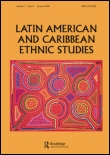
Latin American and Caribbean Ethnic Studies
Navigating the Vibrant Cultures of Latin America and the CaribbeanLatin American and Caribbean Ethnic Studies, published by Taylor & Francis Ltd, stands as a pivotal platform for scholarly dialogue in the realms of anthropology, cultural studies, sociology, and political science. With an ISSN of 1744-2222 and E-ISSN of 1744-2230, this journal has established itself since its inception in 2006, covering a diverse array of topics up to the year 2024. Recognized for its academic rigor, it is categorized within the Q2 and Q1 quartiles based on the 2023 rankings, showcasing its significance within these fields; it ranks in the 79th percentile for cultural studies and 62nd percentile for anthropology according to Scopus. The journal is not only an essential resource for researchers and professionals, but it also serves as an educational tool for students interested in understanding the complex ethnic landscapes of Latin America and the Caribbean. Although it is not an open access journal, its high-impact research contributions make it invaluable for those committed to advancing knowledge in these critical areas of study. This publication fosters a deeper comprehension of the intersectionality of identity, culture, and politics in these regions, thus bridging theories and practices that resonate globally.
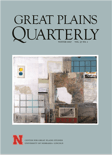
GREAT PLAINS QUARTERLY
Unveiling the Stories of the Great PlainsGreat Plains Quarterly is a distinguished academic journal published by the Center for Great Plains Studies at the University of Nebraska-Lincoln. This esteemed journal, with an ISSN of 0275-7664 and an E-ISSN of 2333-5092, has been a prominent platform for fostering scholarly dialogue on the cultural, historical, and environmental dynamics of the Great Plains region since its inception in 1983, with publication resuming in 1995. Although it is categorized in the Q4 quartile of Arts and Humanities (miscellaneous) for 2023, its contributions are essential for researchers, professionals, and students interested in regional studies, interdisciplinary approaches, and the unique narratives that shape the Great Plains. While the journal is not open access, it provides critical insights into the evolution of the area's socio-cultural landscapes, making it a valuable resource for those engaged in the ongoing exploration of the Great Plains and beyond.
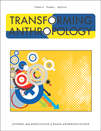
Transforming Anthropology
Championing Contemporary Issues in AnthropologyTransforming Anthropology is a dynamic and influential journal in the field of Anthropology, published by Wiley. With an ISSN of 1051-0559 and an E-ISSN of 1548-7466, this journal has established a reputable position within academic circles, evidenced by its impressive Q2 rating in the 2023 category quartiles and a 77th percentile rank in the Scopus Ranks for Social Sciences. Since its inception, the journal has evolved to reflect contemporary anthropological discourse, addressing crucial issues from diverse perspectives. Although it does not currently operate under an Open Access model, its content remains accessible to a global readership eager to engage with pioneering research. Spanning converged years from 1990 to 1994 and 2010 to 2024, Transforming Anthropology serves as a vital platform for exploring transformative ideas and methodologies within the discipline. Researchers, professionals, and students alike can benefit from the scholarly contributions and insightful discussions fostered within its pages, making it an essential resource for anyone invested in the complexities of human culture and society.

Historia-Santiago
Connecting Researchers Globally Through Open Historical InquiryHistoria-Santiago is an esteemed academic journal published by the Pontificia Universidad Católica de Chile, Instituto de Historia. Since its inception in 2000, the journal has embraced an Open Access model, facilitating broad dissemination of historical research and ensuring that critical scholarly work is freely accessible to researchers, professionals, and students around the globe. With a focus on Latin American history, Historia-Santiago provides a platform for innovative research and contributions that engage with diverse historical narratives and methodologies. The journal aims to foster interdisciplinary dialogue and stimulate scholarly debate, thereby enriching the understanding of historical contexts and their implications in contemporary society. By maintaining high academic standards, Historia-Santiago occupies a vital role in the field of historical studies, encouraging authors to explore new ideas and perspectives that shape the understanding of our past.
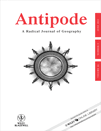
ANTIPODE
Advancing Critical Scholarship in Geography and DevelopmentANTIPODE is a leading academic journal published by WILEY, renowned for its contributions to the fields of Earth-Surface Processes and Geography, Planning, and Development. With an impressive impact factor and ranked in the Q1 category for both Earth and Planetary Sciences and Social Sciences, it is a pivotal resource for researchers and professionals who seek to explore the complex interplay between social and environmental dynamics. Since its inception in 1969, ANTIPODE has provided a platform for innovative and critical scholarship, fostering discussions that drive forward-thinking research in its domain. The journal's rich history continues into 2024, as it remains committed to publishing high-quality, peer-reviewed articles that challenge norms and inspire further research. Researchers, professionals, and students will find in ANTIPODE not only a journal but a community dedicated to advancing knowledge and practice in geography and development studies.
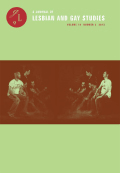
GLQ-A JOURNAL OF LESBIAN AND GAY STUDIES
Advancing critical discourse in queer studies.GLQ: A Journal of Lesbian and Gay Studies, published by Duke University Press, is a pioneering academic journal that has made significant contributions to the critical discourse around LGBTQ+ issues since its inception in 1996. With an ISSN of 1064-2684 and an E-ISSN of 1527-9375, this esteemed publication engages a wide audience of researchers, professionals, and students in cultural studies, gender studies, and queer theory. Ranked in Q2 for Cultural Studies and Q3 for Gender Studies in 2023, GLQ is recognized for its rigorous scholarship and innovative approaches to the study of sexuality and identity. The journal offers an invaluable platform for interdisciplinary dialogue, exploring the complexities of LGBTQ+ lives, cultures, and movements. Although not open access, GLQ remains a vital resource for those looking to stay at the forefront of scholarship in these dynamic fields. Whether you are a seasoned researcher or a newcomer to queer studies, GLQ provides essential insights and fosters ongoing conversations that challenge and expand our understanding of sexuality and gender.

Fronteras de la Historia
Illuminating the Complexities of Our Shared Past.Fronteras de la Historia is a prestigious open-access journal published by the Instituto Colombiano de Antropología y Historia, dedicated to advancing scholarship in the field of History. With its ISSN 2027-4688 and E-ISSN 2539-4711, this journal has established itself as a vital platform for the dissemination of historical research, featuring articles that span various geographical and thematic areas. Since its inception in 1997, it has embraced the principles of open access, promoting the free distribution of knowledge and facilitating broader academic engagement. As evidenced by its commendable ranking in the 2023 Q1 category for History and its position within the Scopus Arts and Humanities rankings (Rank #791/1760), Fronteras de la Historia serves as a critical resource for historians, researchers, and students alike. This journal not only enriches the academic community but also provides a unique perspective on historical narratives, making it an essential read for those invested in understanding the complexities of the past.

Journal de la Societe des Americanistes
Advancing Interdisciplinary Insights in AnthropologyJournal de la Societe des Americanistes, published by UNIV PARIS X PARIS-NANTERRE, ARCHEOLOGIE & ETHNOLOGIE, is a distinguished platform for the dissemination of scholarly research in the fields of anthropology and cultural studies. With an ISSN of 0037-9174 and an E-ISSN of 1957-7842, this Open Access journal has been making academic content freely accessible since 2016, fostering a global dialogue among researchers and practitioners. Based in France, this journal prioritizes interdisciplinary discourse, enhancing the understanding of cultural dynamics and ethnic diversity across the Americas. Although currently ranked in the Q4 quartile for anthropology and cultural studies, its commitment to rigorous peer-reviewed research places it in a unique position to contribute to the academic landscape. Researchers, professionals, and students seeking to explore intricate cultural themes and anthropological perspectives will find the Journal de la Societe des Americanistes an invaluable resource for their scholarly endeavors.
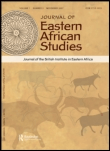
Journal of Eastern African Studies
Exploring the Rich Tapestry of Eastern AfricaJournal of Eastern African Studies, an esteemed publication within the field of anthropology, cultural studies, history, and political science, is published by Routledge Journals, Taylor & Francis Ltd from its base in the United Kingdom. With an impressive impact factor reflected by its Q1 ranking in multiple categories—including anthropology, cultural studies, and history—this journal stands as a critical resource for scholars and professionals interested in understanding the complexities of Eastern Africa. Since its inception in 2009, the journal has explored diverse themes pertinent to the region's socio-political landscape, indigenous cultures, and historical trajectories, while contributing significantly to ongoing academic discourse. Although currently not an open-access journal, its commitment to high-quality scholarship and its accessibility through major academic databases underscore its importance in advancing research and fostering deeper insights into Eastern African Studies. The journal's rigorous peer-review process ensures that only the most relevant and impactful research is disseminated, solidifying its position as a leading outlet in the field.
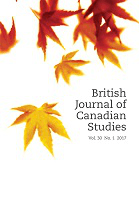
British Journal of Canadian Studies
Fostering Interdisciplinary Dialogue on Canadian IssuesThe British Journal of Canadian Studies, published by Liverpool University Press, serves as a vital platform for the exploration and dissemination of scholarly research related to Canadian studies, spanning the domains of cultural studies, history, literature and literary theory, and sociology and political science. Despite its Q4 ranking across multiple categories in the 2023 journal metrics, it offers a unique perspective on Canadian issues and engages with contemporary debates in these fields, making it a valuable resource for researchers, professionals, and students alike. By facilitating discussions that connect various disciplines, this journal encourages interdisciplinary inquiries and cross-cultural comparisons that enrich the understanding of Canada in a global context. Although the journal is not open access, it is poised to make a significant contribution to scholarship in these areas from its base in the United Kingdom.